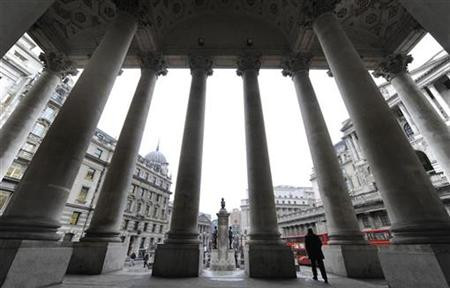Bank holds interest rates for seventeenth consecutive month; 'QE may be revived' says economist

The Bank of England has held interest rates in a widely expected move for the seventeenth consecutive month as spare capacity in the recovery is expected to bring inflation down.
The move, which is unprecedented in the history of governing, means that despite growing GDP, 'doves' outweigh any hawkish sentiment amongst the monetary policy committee. This means that any rate rises are likely to come once the recovery is secured.
The move comes despite Hovis owner, Premier Foods warning of rising bread prices after Wheat fires in the fertile Russian Volga region.
Speaking in last month's minutes however, the Bank of England said it preferred to 'wait and see': "The softening in the medium-term outlook for GDP growth over recent months would put further downwards pressure on inflation, once the impact of temporary factors had wane." they said.
A deflationary period ahead means that inflation is unlikely to rise, and interest rates are likely to stay low.
Conversely should food prices pressure inflation to grow, then interest rates may need to rise: "There is a looming possibility we may get a spike in food prices rising out of climatic conditions, and not just temporarily. I wouldn't be surprised if food prices lead a rise in inflation of 0.5 percentage points by the fourth quarter [of the year]." said Charles Goodhart a previous member of the Monetary Policy Committee.
Should the two go in opposites, then the Bank will face a tough time ahead as economists warn of the growing possibility of 'double-dip' putting further pressure on inflation and interest rates:
"Indeed, the MPC is having to tread a very fine line at the moment, and the committee undoubtedly discussed the cases for both tightening and relaxing monetary policy as well as leaving it unchanged. While GDP growth jumped in the second quarter, the risk of a "double-dip" have been highlighted by recent survey evidence showing consumer confidence heading down to a 12-month low in July, service sector activity losing significant momentum and manufacturing export orders stalling. Tighter fiscal policy increasingly kicking in, persistently tight credit conditions, slowing global growth and problems in the Eurozone combine to pose a serious threat to still fragile-looking UK recovery. At the same time though, consumer price inflation remains worryingly sticky at a well-above target level and inflation expectations have risen (albeit to a limited extent so far)." said Howard Archer, chief economist at IHS Global Insight.
"On balance, we think it more likely than not that the Bank of England will keep interest rates down at 0.50% during the rest of 2010 and through the early months of 2011, given likely bumpy and overall muted recovery in the face of significant headwinds, most notably including the fiscal squeeze that will increasingly start to bite, problems in the Eurozone and slower global growth. We believe that underlying inflationary pressures will be limited by overall muted recovery, low wage growth and significant excess capacity.
"We expect the first interest rate hike to 0.75% to come around mid-2011 and see interest rates still as low as 1.50% at the end of next year.
"One thing that does look clear is that interest rates are likely to remain very low for a considerable time to come, regardless of when they first start to rise. Monetary policy will need to remain loose for an extended period to offset the impact of the major, sustained fiscal squeeze.
"Meanwhile, there remains a very real possibility that the Bank of England could revive Quantitative Easing should the economy falter appreciably over the coming months. The Bank of England is clearly concerned about still tight credit conditions."
© Copyright IBTimes 2024. All rights reserved.






